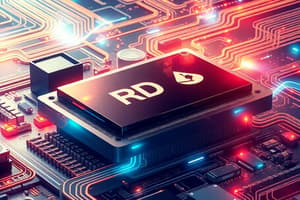Podcast
Questions and Answers
What are some basic operations that the CPU performs?
What are some basic operations that the CPU performs?
Adding, dividing, multiplying, reading array of bytes, clearing bits, writing contents of registers
How do hardware components impact computer performance?
How do hardware components impact computer performance?
Faster processors lead to quicker computation speeds; larger RAM enables multitasking flexibility
What types of components make up a computer's hardware?
What types of components make up a computer's hardware?
Mechanical, electronic, and electromagnetic components
What role do input devices play in computer systems?
What role do input devices play in computer systems?
How does a computer display visual feedback to users?
How does a computer display visual feedback to users?
What does the combination of hardware components allow individuals to do on a computer?
What does the combination of hardware components allow individuals to do on a computer?
What are the main hardware components found in a computer?
What are the main hardware components found in a computer?
Name some input devices commonly used with computers.
Name some input devices commonly used with computers.
What are examples of output devices in a computer system?
What are examples of output devices in a computer system?
Describe the role of CPUs in a computer.
Describe the role of CPUs in a computer.
How has memory storage technology evolved over time?
How has memory storage technology evolved over time?
Why is hardware essential in a computer system?
Why is hardware essential in a computer system?
Flashcards are hidden until you start studying
Study Notes
A computer is a device designed to process information using software programs. It consists of both hardware components and software applications. At its core, there's usually a central processing unit (CPU), memory storage like RAM, hard drives, and optical disc drives. Input devices such as keyboards, mice, touchscreens, microphones, cameras, and scanners also play important roles. Output devices include displays, speakers, printers, and other peripherals. Processors can range from very simple chips that run only one program at once to advanced ones capable of running thousands of individual processes simultaneously. Memory storage technology has evolved over time too—from small floppy disks to large hard drives with hundreds of gigabytes of capacity. These parts work together so that computers can perform tasks like opening websites, playing games, creating documents, and sending emails.
Hardware is essential because it provides computing power and physical interfaces between people and machines. For instance, CPUs serve as the main brains behind each task done by a computer. They fetch data from external sources into their internal registers, execute instructions based on those values, store results back out again if needed, etc.. The CPU's basic operations include adding two numbers together and storing their sum; dividing one number evenly among several others; multiplying two sets of input digits times another set of output digits; reading an array of bytes filled with zeros at position 0x8000; clearing all bits in this area except bit 7; writing the contents of register 2 into register 4 plus one more byte at address 0x8000. Hardware components impact performance significantly. For example, faster processors mean quicker computation speeds while larger amounts of RAM offer increased flexibility when multitasking multiple apps simultaneously.
In summary, a computer's hardware comprises various mechanical, electronic, and electromagnetic components that enable users to interact with digital information through input devices, display visual feedback via output screens, and manipulate data within the system. This combination allows individuals to create, edit, organize, and share files amongst themselves or over networks.
Studying That Suits You
Use AI to generate personalized quizzes and flashcards to suit your learning preferences.




